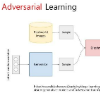Equalized odds, as a popular notion of algorithmic fairness, aims to ensure that sensitive variables, such as race and gender, do not unfairly influence the algorithm's prediction when conditioning on the true outcome. Despite rapid advancements, current research primarily focuses on equalized odds violations caused by a single sensitive attribute, leaving the challenge of simultaneously accounting for multiple attributes largely unaddressed. We bridge this gap by introducing an in-processing fairness-aware learning approach, FairICP, which integrates adversarial learning with a novel inverse conditional permutation scheme. FairICP offers a theoretically justified, flexible, and efficient scheme to promote equalized odds under fairness conditions described by complex and multidimensional sensitive attributes. The efficacy and adaptability of our method are demonstrated through both simulation studies and empirical analyses of real-world datasets.
翻译:暂无翻译




